Noyce: Training Math Teachers Who Foster Equity in the K-12 Classroom
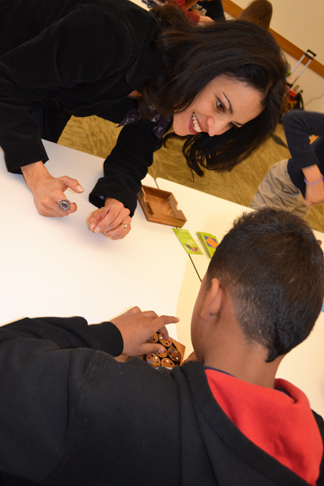
Rochelle Gutiérrez interacts with a local middle school student at Noyce's iMATHS club.
May 2, 2013
This is Rochelle Gutiérrez' hope for her Noyce scholars when they finally become K-12 math teachers: that when they look at themselves in the mirror every day, they will be able to say, "I'm doing what I wanted to do when I went into education."
Illinois' NOYCE program in math is different from others around the country. Most just give out scholarships or have a few days of summer professional development or seminars as a requirement. In Illinois' program, "Preparing Excellence and Diversity in Secondary Mathematics Teachers for Illinois' High Needs Schools" (Noyce), scholars are not only exposed to creative math, pedagogy, and mentoring, but they are prepared to deal with school politics and to effectively teach marginalized minority students.
Funded through the National Science Foundation's Robert Noyce Teacher Scholarship Program, Illinois' Noyce program seeks to encourage talented mathematics majors and professionals to become K-12 math teachers. To receive scholarships, scholars must agree to teach math in high-needs schools. Undergraduates, who minor in education, receive two years of funding and must teach for at least four years. Graduate students from math-based careers qualify for one year of funding and must teach two years.
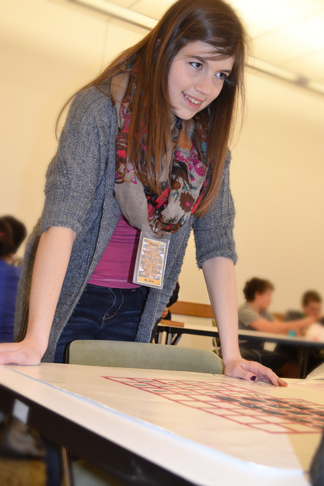
Noyce Scholar Erin Berg plays a math game with a local student during iMATHS.
The primary course Noyce scholars all take is a 3-hour seminar taught every other week. It exposes students to more rigorous mathematics than in regular math programs, including creative, outside-of-the-box math taught by a nationally board-certified CPS teacher who partners with Noyce.
Another important component of Noyce is individual mentoring sessions. Rochelle Gutiérrez, the Principal Investigator, and other graduate students discuss with scholars how their program or classes are going, or address things students are grappling with. Also vital is networking, both informal and via study groups, where students who are a year ahead or have completed the program can give struggling younger students advice about classroom issues or how to navigate the program.
"Many of them have said that it's actually those mentoring sessions that help them really develop their stance on teaching," reports Gutiérrez. "They hear themselves talking about what's important, or what's not important, or they're critiquing what's going on in the schools that they're trying to make sense of, 'Well, what would I do differently?' It's one thing to say, 'I don't like the way the cooperating teacher I'm working with is doing this,' or 'I think this is not right about how schools treat kids.' So, what are you going to do about it?"
To help scholars develop strategies to change the way schools treat kids, Noyce introduces anti-racist, social justice issues around teaching and equips scholars with effective instructional strategies that utilize marginalized students' strengths rather than trying to fit them into a certain mold.
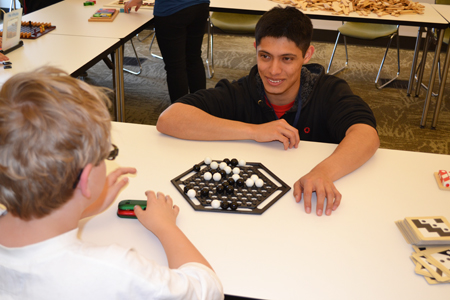
Emmanuel Del Rio, a junior in math at Illinois, plays Abalone with a local student.
This includes encouraging scholars to "critique the narratives that are being written about marginalized and low-income students in urban schools," shares Gutiérrez, and then to consider, "How do you effectively engage them in school and build on the linguistic strengths that they have from their backgrounds rather than thinking you have to somehow make up for something they don't have."
Gutiérrez also encourages her students to think beyond the achievement gap, and getting kids to score well on tests, but to consider the identities kids are creating in the classroom and the ways in which power in a classroom is based on who gets to talk. "We encourage our students to how can they build lessons, how can they build classroom cultures that actually take up the identities of the students."
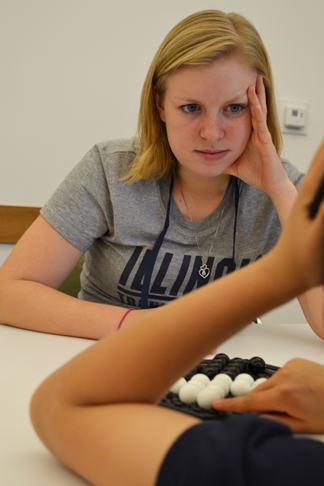
Noyce Scholar Hannah Worman tries to out-strategize a local student on Abalone during iMATHS.
Noyce's emphasis on marginalized students has the lofty goals of redressing social injustice, and impacting students' economic status via job opportunities in math. However, according to Gutiérrez, it also has the potential to impact the discipline itself. She argues that recruiting "people who have not traditionally gone into mathematics…will change the field, because they'll ask different questions and think about things differently." As an example, she cites the positive changes in chemistry labs staffed mostly by women during wartime: "New forms of chemistry were formed because they asked different questions. They had different goals for doing what they were doing."
Beyond content knowledge, pedagogical knowledge, and knowledge of students, Noyce stresses that teachers need political knowledge. Because idealistic young teachers who dream of changing their educational world will encounter resistance—from administrators, other teachers, even parents and students—the program seeks to prepare its scholars, so they have a plan in place.
"You come out of a teacher education program," says Gutiérrez, "and you're all excited, and you think, 'Oh, I'm going to do all these great things,' and then you hit the school…We say you need to learn how to plan for the politics of schooling, just like how you have to plan to develop lessons."
What happens when her scholars hit this wall of resistance, whether it's students who don't enjoy math and don't think they can learn it, or jaded teachers (or even parents) who have lost their idealism and bought into the mentality that "These students can't learn," or administrators who control the purse strings and say, "That's not how we do things here"?
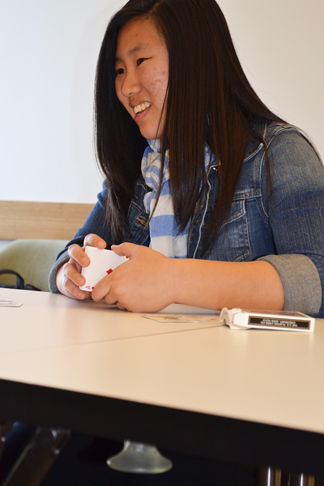
Eileen Ryu does a math-based card trick with an iMATHS participant at the Champaign Public LIbrary.
Gutiérrez and company suggest "creative insubordination," which Gutiérrez defines as: "You need to find a way to work within the system but against the system at the same time."
An example of this is iMATHS (Inquiring through Mathematics As Thoughtful HumanS), their bilingual, after-school, club for middle-school and high-school kids held at the Champaign Public Library. Although they have regulars who come every Thursday, like Pied Pipers, Noyce scholars also roam about the library, trying to entice students to come join in on the fun.
"We particularly invite and encourage and cajole black and Latino teenagers. So we find kids who are on the front steps of the library; we find kids who are in the teen room, or who are hanging out in the café, and then our scholars, who volunteer at the club, come through the library…They've got a robot, or they've got origami, or they've got some kind of math game. They walk through the library and find kids and say, 'Hey, wanna' come do this thing with us in the other room?'"
Via iMATHS, Noyce scholars serve as "ambassadors for mathematics," hoping to help students, especially those who don't want to become mathematicians or scientists, realize that math is part of their everyday lives.
The sole purpose of the club? To show kids that math can be fun. Gutiérrez stresses that it's not remedial, trying to make up for whatever kids aren't getting in school, like a tutoring session or homework help.
"We see that what's actually going to turn kids on is a different version of math than what they do at school…math that doesn't involve formulas and doesn't involve procedures, paper and pencils, and calculators."
Story and photos by Elizabeth Innes, Communications Specialist, I-STEM Education Initiative
More: Champaign-Urbana Community, Funded, K-12 Outreach, Math, Teacher Professional Development, Underserved Minorities, 2013
For more information about the Noyce program, see this additional I-STEM webarticle: Noyce Scholars: Taking Student-Centered Math to High-Needs Schools.
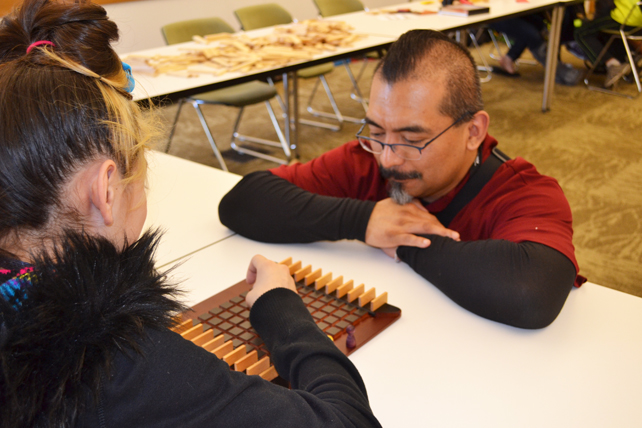
Juan Gerardo plays a math game, Quoridor, with a student at iMATHS.













.jpg)
















